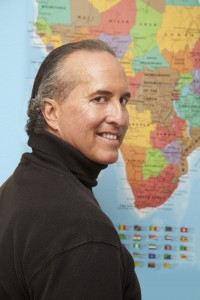Saving a species
A Tulsa conservationist fights to protect elephants.

Phillip Hathaway
At first glance, Tulsa seems to be an unusual location for a nonprofit devoted to ending elephant poaching. However, the founder of the relatively new ElephantRescue.net, Phillip Hathaway, explains, “The people here are gregariously friendly. You can have a great conversation with a stranger at the grocery checkout. This makes it easy to spread the word.”
Hathaway, who grew up in Oklahoma City, served three years on active duty in the United States Army, attended Oklahoma City University and the University of Kent in Canterbury, England and holds a Bachelor’s and Master’s degree in the social sciences. After his university studies, he circled the world twice visiting twenty-four countries on five continents.
Always an animal lover, he says elephants have a special place in his heart because they possess what he calls the “divine traits” of “love, joy, peace, patience, kindness, gentleness and self-control.”
In 2014, through research and consulting with experts, he learned that elephants were in danger of extinction and was shocked to discover how quickly the species was disappearing.
“We’ve lost 780,000 African elephants since 1980 to poachers,” he says. “There were 1.2 million African elephants in 1980 but only 420,000 in 2012.”
In response to these troubling statistics, he founded ElephantRescue.net, whose mission is “ensuring a safe, natural environment for all elephants.” It became a 501(c)(3) in May of 2015.
Hathaway blames corrupt African leaders and the demand for ivory in southeast Asia for the elephant killings.
“China has 20 percent of the world’s population but only 7 percent of the arable land,” he says. “So, they must import raw material. And they’ve quite literally colonized Africa for this purpose. They barter mining, oil drilling, highway and infrastructure work in Africa for their raw material needs. This gives them a feeling that they can take what they want, including elephant tusks.”
Hathaway hopes to put an end to this dangerous trend with ElephantRescue.net.
“To stop the killing, it is essential to destroy all stockpiles of ivory immediately for they always go to market, which in turn, drives demand and more killing,” he says.
This is part of the plan Hathaway has developed to prevent elephant extinction; the entire plan is available on the group’s website. He says efforts will begin in Botswana, which is home to half of the African elephant herds.
“We will support Botswana through reforestation, water conservation, herd management and other ways” in cooperation with the government, he explains. “From Botswana, our work will spread to elephant ranges in other countries. We also hope to manage and purchase land bordering elephant ranges to control unprecedented human encroachment.”
Hathaway says saving a species will cost tens of millions of dollars and will take decades.
There are several ways Tulsans can support ElephantRescue.net, including attending a black tie fundraiser planned for September. Volunteers also are needed. But the most helpful way, he says, is to make a tax-deductible donation on the group’s website.
“Phillip’s dedication to the welfare and preservation of elephants as naturally wild and free to roam the many miles they travel each day is without question,” says ElephantRescue.net Advisory Board Member Donald Feare, an animal welfare attorney in Arlington, Texas, who has worked with Hathaway for the past year. “His constant efforts to help elephants worldwide is a demonstration of his compassion toward that species. Knowing that most countries do not view elephants and the need to protect and conserve them as we do, he continues to attempt to enlighten their understanding and promote humane methods that countries can adopt and then offers alternatives to assist them in those efforts. I know of few people in the animal world who are willing to undertake such a monumental task.”
Hathaway has another business based on a book he wrote, The Psychological Elegance of Talent, which helps students discover their talent. Although he has only traveled to Africa once, he expects to eventually live there half the year. He has spent the past 14 months building ElephantRescue.net in Tulsa.
“Much of the job of rescuing is done by faxes, emails, letters from attorneys, etc., that I do right from my little home office,” he says. “Traveling is costly and often is not the best use of the elephants’ money — airfare and two weeks of accommodations for one person in Africa costs about $7,500.”
Although elephant conservation has many obstacles, Hathaway is confident that ElephantRescue.net will help end poaching.
“It is a long, hard war,” he says, “but we shall win.”


Leave a Comment